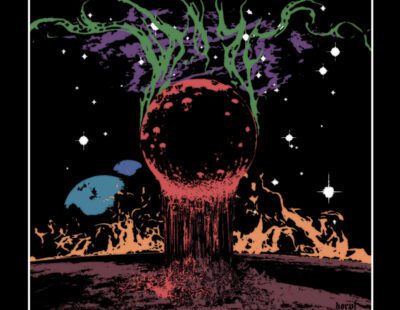
Renaissance man, also called Universal Man, Italian Uomo Universale, an ideal that developed in Renaissance Italy from the notion expressed by one of its most-accomplished representatives, Leon Battista Alberti (1404–72), that “a man can do all things if he will.” The ideal embodied the basic tenets of Renaissance humanism, which considered man the centre of the universe, limitless in his capacities for development, and led to the notion that men should try to embrace all knowledge and develop their own capacities as fully as possible. — Encyclopedia Britannica
Daniel Austin lives many lives — all uniquely intriguing, uniquely profound, uniquely eloquent, and uniquely brutal.
Most Decibel readers likely know him as the frontman of killer Texas chaos merchants Die Young or the new metallic hardcore supergroup Tooth and Claw.
But Austin is also an actively competing powerlifter (his book The Way of the Vegan Meathead: Eating for Strength is uber-essential for anyone who vibes with the title) as well as an author whose stunning, extremely honest and vulnerable poetry, prose and essays bridge the gap between the two Henry’s — Rollins and Miller.
If that’s not an extremely fucking rare range of passions, nothing is. But the real feat isn’t that Austin does so much. It’s that it never feels as if he’s dabbling. Or stretched thing. His multidisciplinary art all has the purity and force of 100 percent devotion and conviction coupled with an execution to match.
Fitting for a man releasing a book that opens with the following inscription:
in Memphis, I learned
if you can’t do what it takes
it’s not love.
Today Decibel has the dual honor of not only mining Austin’s iconoclastic mind a bit regarding his very funny, sweet, and emotionally harrowing new tome The Dogman of Belvedere but also premiering an exclusive stream of an exquisitely rendered extreme music re-interpretation of P.J. Harvey’s “To Bring You My Love” from his solo covers project Mainländer, which he aptly describes as “something like Disfear and Motörhead dabbling in the realm of gothic folk music, with occasional explorations into other, stranger territory.”
So without further ado…
Nobody was really asking for me to do this [Mainländer material], and I don’t think it’d be appropriate to do a bunch of transformative cover songs in Die Young or Tooth and Claw, but I still wanted to do to pay homage to the folk, gothic, and singer-songwriter artists that I enjoy, so I needed to make an outlet for that impulse. Granted, I am not about to pick up an acoustic guitar and start singing regularly, nor am I going to start playing synth and bellowing like Andrew Eldritch. I love that stuff, I just don’t have the drive to make something in that vein myself. Not my forte. I figured the best I could do with some songs of this nature was to create some sort of hybrid between what Lemmy and Tomas Lindberg might do…
“These are existentially heavy songs — about suffering, fate, desire, failure…you know, fun stuff like that! Seriously, the Leonard Cohen song ‘Steer Your Way’? What the fuck. He wrote those words while dying of cancer in his eighties. I encourage everyone to go read the lyrics to that song. They shatter me every time I read them. And then PJ Harvey’s ‘To Bring You My Love’ is an epic, mystical portrait of an ultimate longing. There are few songs I can think of that communicate feelings like that so simply yet to such a powerful degree. I have been obsessed with that song for a long time, and ever since I spent a year living in the desert alone, I decided I had to cover it one day. I don’t know why I like the serious, melodramatic stuff, but I do. That’s just me, and that’s what I have always liked. With Mainländer, I saw an opportunity to take some of the most existentially heavy songs I know of and make them ‘rock,’ for lack of a better term…
“The Dogman of Belvedere is another installment of my poetry books, the third one so far. I think it is the funniest one yet, but it has no lack for heaviness either. It also includes my first short story, so there’s a fair share of evolution in this book from my last one — not just regarding my focus as a writer, but I think in my attitude about living, too. Dogman spans out from my own inner dialogue and gives a considerable amount of attention to interesting characters I was living around during a rough year in Memphis, Tennessee. Contemplating the lives and feelings of other people was a fun challenge, and I think it gave this book a wider portrayal of colors of the human spirit. All the poetry that I have put out is coming from about as raw a place within me as I can manage to speak from. There are no rules in this kind of writing, other than to be as real as possible and let things fly. I believe in saying what needs to be said in the moment–even if it’s ugly, even if it’s regrettable, or even if it’s intensely vulnerable stuff to admit. Let’s get to the other side of those feelings and then objectively see what life feels like then…
“My repertoire as a musician is fairly limited. I think I got into punk and hardcore so much as a teen because it’s really the best entry level for musicians there is. We make up for our lack of talent and skill with an abundance of feeling and energy. I could see fans of Die Young loving these Mainländer songs, as I think they are most reminiscent of the “Loss” EP era of Die Young. They have the same kind of melancholy punk feel, and a lot of minor keys/chords. And really, I could see Tooth and Claw fans digging the PJ Harvey cover, because of its blackened and atmospheric touches in various parts. It’s by far the most “metal” song of this Mainländer collection. None of this stuff is terribly unlike my other bands, but the vision felt different enough that it needed to be a new name. So here is Mainländer — I hope you enjoy it.







